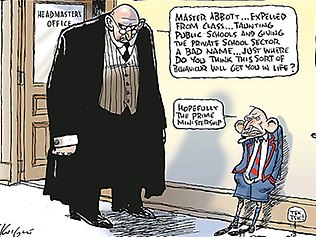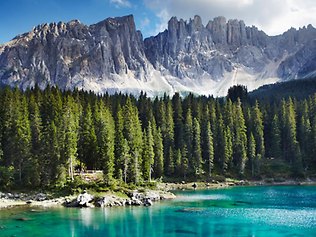THE Herald Sun's chief political correspondent Philip Hudson answers the big questions on the Government's carbon tax plan.
Q: Why is the government introducing a carbon tax?
A: It says
this is to put a price tag on pollution. At the moment business and
industry can pollute for free. The Government says the amount of
pollution needs to be cut, because it is contributing to climate change.
Q: When would the carbon tax start?
A: July 1, 2012.
Q: How much is the carbon tax?
A: It starts at $23 a tonne of carbon dioxide pollution.
Q: Will the tax go up?
A: Yes. It is designed to increase 2.5 per cent every year, for the
next three years. It will rise to $24.15 on July 1, 2013 and then to
$25.40 on July 1, 2014.
Q: Will the tax last forever?
A: Not in this form. From July 1, 2015, it will convert into an emissions trading scheme.
Q: What's the difference?
A: A carbon tax is a fixed price
scheme where about 500 companies that emit the most greenhouse gases are
charged the tax - excluding businesses in the agriculture sector and in
most of the transport sector. Under this scheme there is no limit on
the amount of pollution. An emissions trading scheme is where the
government sets a cap on the total amount of pollution that can be
released each year. Businesses compete for permits and can trade
permits, within that cap. The price can vary but the amount of pollution
is fixed. Each year the Government could lower the cap - meaning
Australia's emisisons will fall.
Q: Who pays the carbon tax?
A: The government says only the 500 companies with the biggest carbon
pollution emissions will pay. That's companies such as Macquarie
Generation Australia and Bluescope Steel.
Q: How much money will that raise?
A: About $24.5 billion over three years.
Q: Where does that money go?
A: About $15.3 billion will be given back to workers as tax cuts,
household energy efficiency measures and welfare payments. The rest of
the money will be used to support jobs and help industry transition, and
on other green programs.
Q: When will I get my tax cut or pension rise?
A: Changes to the tax system begin on July 1, 2012. Payments to
pensioners, people with family payments, or welfare recipients - called
clean energy supplements - will be provided between May and June, 2012.
Q: Do I pay carbon tax at the supermarket check out?
A: Not directly. Unlike the GST which appears on the shopping docket
and is paid by consumers, the carbon tax is paid only by the top 500
companies with the biggest carbon pollution emissions. But those big
companies will pass the cost of the tax onto their customers.
Q: Will that cause a blow out in the cost of living?
A: Treasury estimates prices across the whole economy will only rise by
0.7 per cent, much less than under the GST. On average, households will
pay $9.90 a week more.
Q: Won't it make electricity more expensive?
A: Yes. Average household power bill go up by 10 per cent in 2012-13
and gas will go up 9 per cent. That will increase further in future
years. But the government says nine out of 10 households will get
compensation to soften the blow and 4 million people will actually be
better off.
Q: If people are better off, what's the point?
A:
That's what many critics say. The Government insists it doesn't want to
hurt low-income people and families but is trying to encourage big
business to use more renewable and low-emission energy alternatives to
the cheaper and dirtier energy sources such as coal. It says if
households switch to green energy alternatives they can pocket the
savings.
Q: Will this kill the coal industry?
A: Again, that
what many critics fear, but the one thing the Greens and the coal
industry seem to agree on is that the coal industry will continue to
grow in the next decade. Coal miners say the carbon tax will restrict
that growth, but the government has a $1.3 billion package to transition
the coal industry to a 'cleaner' future.
Q: Will it cost more to drive to work?
A: Petrol is not included in the scheme. But domestic airfares will go
up because domestic aviation fuel excise will be included.
Q: How much pollution will be cut by the carbon tax.
A: About 159 million tonnes of pollution will be cut from our
atmosphere by 2020 - the equivalent of getting 45 million cars off the
road.
Q: What effect will that have on stopping the predicted rise in temperatures?
A: With international action, this could help limit temperature increases at less than 2C above pre-industrial levels.
Q: Will Australia doing this make a difference?
A: The Government says Australia has the highest emissions per capita,
even though it only represents 1.5 per cent of global greenhouse gas
emissions. It says Australia has much to lose from global warming so it
should start to cut emissions early.
TO COMMENT ON THE CARBON TAX PLAN CLICK HERE
More Story Content
Results: Carbon tax
This poll was closed on 2011-07-16 00:00:00
Results: Your say
This poll was closed on 2011-07-16 00:00:00
Results: Carbon tax vote
This poll was closed on 2011-07-16 00:00:00
Results: Your say
This poll was closed on 2011-07-16 00:00:00






























Nazi taunt puts Assange's mother off-air
Posted by MR FO AN ET IC at 4:51 PM August 19, 2012